They were abused by men. Then they underwent special forces training. Now they're stopping the men who are illegally killing protected animals.
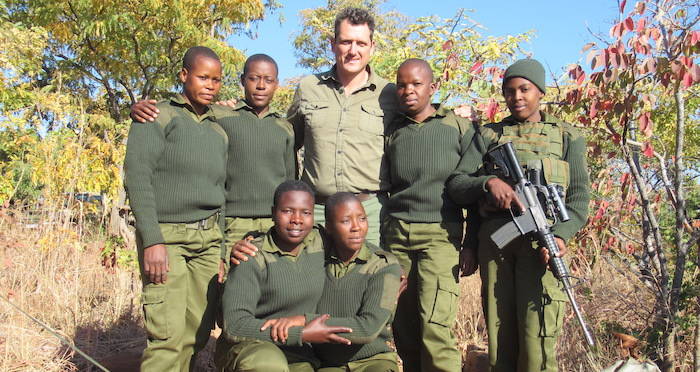
Kate Bartlett/Picture Alliance/Getty ImagesDamien Mander and the Akashinga rangers. Zimbabwe. 2018.
Animal poaching in Zimbabwe has become untenable, but the country’s rhino and elephant populations have now found a powerful ally in the all-female group of abuse victims-turned-sharpshooters that calls itself Akashinga, or “the Brave Ones.”
For Victor Muposhi, an ecologist at Chinhoyi University, time is of the essence. With Zimbabwe having proffered 20 percent of its land for commercially viable trophy hunting purposes, and still unable to keep its protected animal population from criminal killings, the ecosystem is in danger of irreversible disaster.
“Cecil the lion marked the birth of the greater debate around the issues of morals and ethics in hunting and whether it is sustainable or not,” Muposhi told The Guardian. “Five years from now, if we do not have other options, then it will not be viable to save these areas,” he warned.
Fortunately, Damien Mander may have created one of those options with the International Anti-Poaching Foundation. Its special ingredient: the grit, anger, and desire for purpose of Zimbabwean women who’ve been domestically or sexually abused. In them, the former special-ops sniper from the Australian Defense Force has found the ultimate resource in these proud, strong, and empowered women who are tired of men negatively affecting their community.
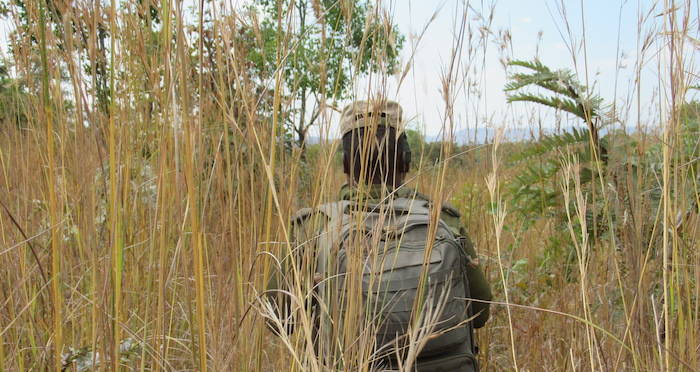
Kate Bartlett/Picture Alliance/Getty ImagesAn Akashinga ranger on patrol. Zimbabwe. 2018.
“Thirty-six women started our training, modeled on our special-forces training, and we pushed them hard, much harder than any training we do with men,” said Mander. “Only three people dropped out. I couldn’t believe it.”
One of those women was 17-year-old Kelly Lyee Chigumbura. She was raped near her home in the Lower Zambezi Valley, and because Shona’s cultural norms dictate that a father’s parents must take care of the child if the mother isn’t fit to, her rapist’s parents took her daughter Yearn Cleopatra away.
Chigumbura wanted to become a nurse but saw no hope for the future. “My goals had been shattered,” she told the BBC. “It was like I couldn’t do anything more with my life. “Everything was misery.”
When an opportunity arose to defend Phundundu Wildlife Park—a 115 square mile former trophy hunting area and home to around 11,000 elephants—Kelly jumped at the chance. In order to become official rangers and rid the park of its armed, male poachers, however, she’d have to survive Mander’s excruciating three-day boot camp.
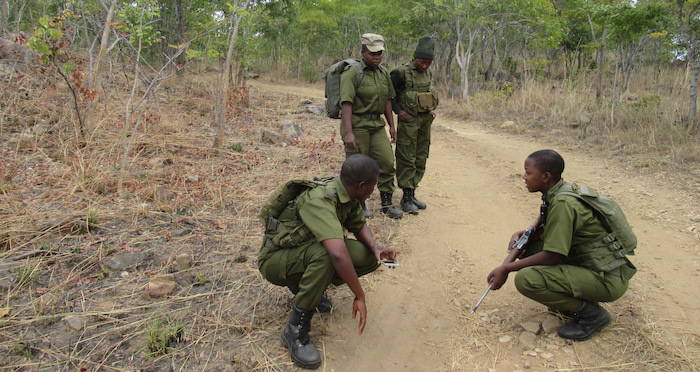
Kate Bartlett/Picture Alliance/Getty ImagesAkashinga rangers regroup. Zimbabwe. 2018.
While the results of that period pointed toward an immense source of fortitude, will, and desperation to overcome life’s challenges — with only three women dropping out — Mander’s testosterone-laden military background left him shocked.
“I have built a career across three continents by bringing hardened men to the point of breaking and then rebuilding them into what we need on the front lines, and women never factored into the equation,” he told CBS. “We not only prided ourselves on being the only all-male unit in the military but we ridiculed units that transitioned into accepting females.”
But Mander wasn’t prepared for people like Nyaradzo Hoto, a 25-year-old who fled her abusive husband in search of a better life, and the inner strength to not only rival but surpass the mental and physical stamina of Mander’s male peers.
“The abusive thing was refusing me to find a job, to look for a job, and to proceed with my education,” said Hoto. “That’s where the fight starts. Sometimes he clubs, he hits me.” Hoto was often beaten so badly that afterward, she couldn’t even stand. “I just told myself I am wasting my time,” she said. “I have to do something. It’s too much now.”
In the past year, becoming a wildlife ranger and part of Mander’s female sniper squad has turned Hoto’s life around entirely. She sees herself as a valuable, confident person who doesn’t need to rely on anyone else.
“I can do something great, I can save myself,” she said. “I can see that no man is going to challenge me again.”
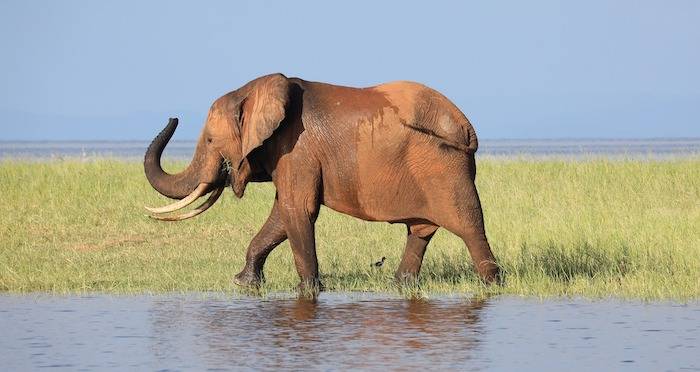
Pixabay
From 2008 to 2015, elephant slaughter increased by 30 percent across the African continent, largely due to poaching. More than 7,000 rhinos were killed for their horns in one decade. Around 8,000 elephants were poached in the last 16 years as well, the BBC reports. Those figures are distressing for Phundundu, and Zimbabwe in general — home of the second-largest elephant population in the world.
“Commercially, we are dead,” said Jan Stander, director of Phundundu Wildlife Park. “Our area went from viable to non-viable. We lost hundreds of thousands of dollars as an industry.”
Stander hired Mander in a last-ditch effort to turn things around. After the Australian set up shop, he told the 29 surrounding villages he was recruiting female rangers, preferably abused, orphaned, or AIDS-affected women. Training included “exposing them to the four pillars of misery: hungry, tired, cold, and wet.” Challenges had endurance and team-building at their core, and so he had the Akashinga pack 200-pound tents and drag them up a mountain with their legs tied together, only to reassemble them upon arrival.
For those that survived the boot camp without wavering and for those Mander felt were the best of the best, official ranger status, and a new sense of purpose, awaited. Besides the fact that surrounding villages are prospering from the Akashinga’s work for the International Anti-Poaching Foundation — 62 cents of every dollar made go back to the community, with profits also helping provide labor and construction of both a dam and greenhouse — the women’s spirits are being nurtured.
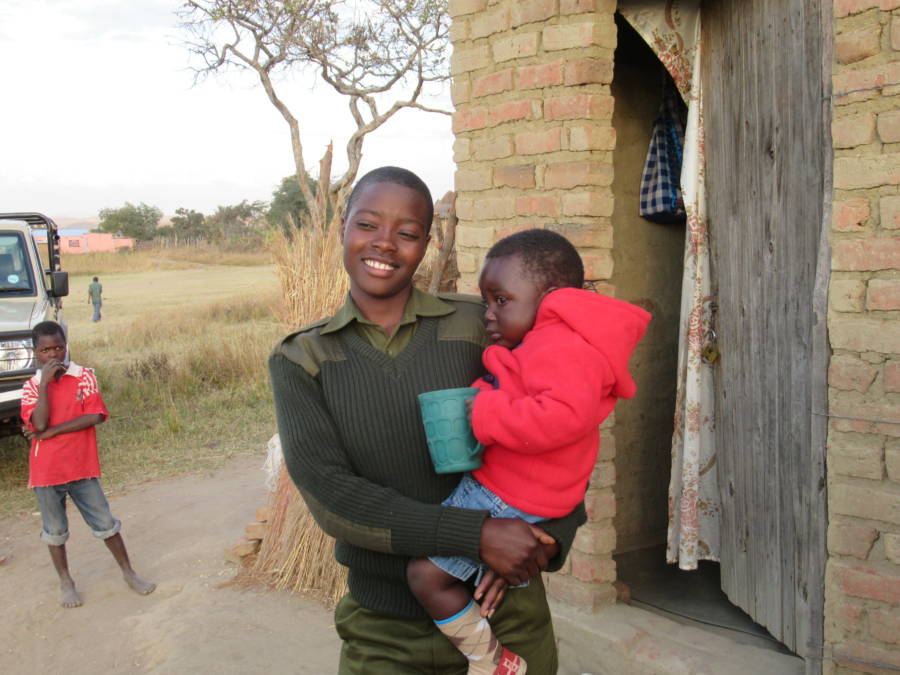
Kate Bartlett/Picture Alliance/Getty Images An Akashinga ranger and her son. Zimbabwe. 2018.
“When I manage to stop poachers, I feel accomplished,” said Chigumbura. “I want to spend my whole life here on this job, arresting poachers and protecting animals.” Even surrounding onlookers, like documentarian Alistair Lyne, are aware of what has happened within these women.
“The change in them, the shift, is unbelievable,” said Lyne. “Whereas before they were ashamed in a way, now they have a spirit to them. They’re walking on air.”
The Akashinga have managed to arrest 80 armed poachers in the last year. When they visit schools for speaking engagements, Mander said they’re “mobbed like rock stars.”
“Since becoming employed as a ranger, I’m now able to take care of my child,” said Chigumbura. “I can go back to high school and I can have a life as an experienced professional. I see myself as a better person.”
But it’s not just the women who’ve been irrevocably changed by this experience. Mander, too, seems to have learned a lot from the Akashinga. “I think women, given the opportunity, will change the face of conservation forever,” said Mander. “I think we have seriously under-estimated one of the most powerful forces in nature.”
After reading up on Zimbabwe’s Akashinga rangers, read about lions killing a poacher and leaving behind only his head. Then, learn about the Kenya Wildlife Service and its efforts to protect their land from poachers.





